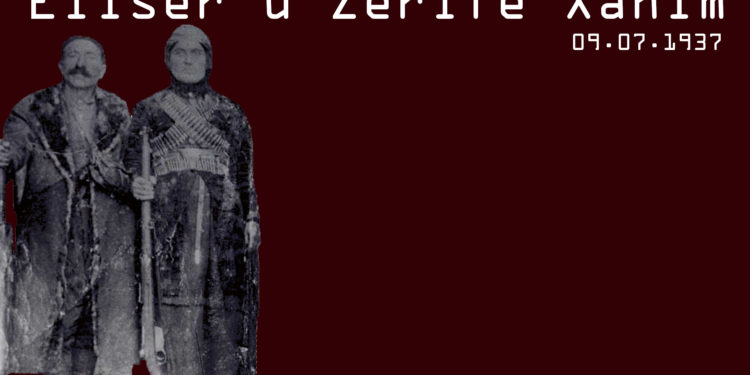THE KOCGIRI REBELLION
In February 1920, the people of Kocgiri take action to implement autonomy demands from the well-known ‘14 Principles’ by US President Wilson, which would propose the post-war autonomy of the non-Turkish peoples whose land was being occupied by the Ottoman Empire (Kurdistan).
In fact, in July 1920, Elisers forces began to control the Kangal-Zara region and in August, they would attack a unit connected to Ankara. Eliser would gather the most influential tribe leaders within the region, and all together, on 25 November 1920, they prepare a declaration for the Ankara government. The declaration called on Ankara to grant autonomy to the Kurdistan regions tribes in accordance with the articles of the Treaty of Sevres on 10 August 1920, which envisaged the establishment of independent Kurdistan in the provinces of Elazığ, Diyarbekir, Bitlis and Van.
In addition, the release of detained Kurds in Elaziz (Elazig), Malatya, Sivas and Erzincan prisons was demanded; and Turkish officials and soldiers were requested to be withdrawn from the regions where the Kurds were the majority.
The Kurds were persuaded by regional leaders to join the Parliament as deputies because the leaders of Dersim whispered in their ears that Sevres offered some opportunities not only for Kurds and Zazas but also for Armenians. The possibility of a peaceful solution and autonomy of the Kurdish region had enabled the leaders of the region to make peace with Ankara.
On the same days, 72 Kurdish and Zaza MPs were brought to the Parliament with traditional clothes and a telegram was sent to the Entente States stating that they were with the Ankara government. This was far from the truth. The people who had been in that telegram were the survivors of the tortures applied to them by the Turkish state, who had tricked them.
The tribes of Kocgiri would demand their autonomy, up until they realise that the Turkish state did not intend to fulfil the promise.
On March 6, 1921, the Kocgiri rebellion would begin, the Kurds were going to take back their land, and Eliser would be the pioneer after witnessing the brutality committed against them. When the rebels began to attack the troops sent by Ankara on March 6, martial law was declared in Sivas, Erzincan and Elazığ.
On 13 March 1921, the Central Army under the command of Nureddin Pasha, who proudly stated that “we [Turkish army] have cleared the ones who say “zo” (Armenians), now we will clear the ones who say “Lo” (Kurds)” was sent to the region.
The report submitted to the Parliament about the activities of Nureddin Pasha in the Kocgiri rebellion is as follows:
“132 villages of the district of Ümraniye and the fighting enemy were burned and destroyed, and hundreds of people were killed. In addition, all goods, grains and animals have been looted. Thousands of people in the mountains, the countryside, are in starvation and poverty, left to die.”
The government deemed it sufficient to suppress the rebellion, but Nureddin Pasha was in favour of the continued rigorous measures against the region. In particular, he insisted that the tribes be distributed in a way that they could not stand up again and scattered in different parts of Anatolia
On June 17, 1921, Eliser and Haydar were surrounded and Ankara dominated the situation. Nuri Dersimi and Eliser managed to escape. Around 300 rebels were sentenced to various penalties, including death.
ZARIFE, WARRIOR AND COMMANDER
Zarife is the wife of Eliser, one of the leaders of the Koçgiri Rebellion of 1921. Zarife is described as a tall, burly, brave Kurdish woman with the military characteristics of a Kurdish woman.
Zarife’s role in the Kocgiri rebellion is often overlooked due to the fact that she is the wife of the leader of a rebellion. The truth remains that Zarife was a commander; Eliser would ask for Zarifes opinion before he did anything, Zarifes decision would be the final say in guiding the emerging conflicts. She was a warrior.
It was said that the only woman who could sit at Seyit Rıza’s table was Zarife. There were no children of the couple, who were very attached to each other and called each other ‘Heval‘, (comrade).
BETRAYAL
During the days when the Dersim Operation had intensified, Nuri Dersimi was going to Aleppo and Eliser and Zarife, who had decided to take refuge in the Soviet Union per the suggestion of Seyit Rıza, were hidden in a cave on Tujik Mountain.
On July 9, 1937, one of Seyit Riza’s co-workers, Zeynel and his four friends, supposedly visited the couple. When the couple realized that they had been trapped, they resisted the shots fired at them but eventually fell martyr.
The government supported this obligation with money and praise and made Rayber and Zeynel informants and militias of the state. Zeynel and Rayber handed over the cut heads of the couple and their books, writings, poems and valuable belongings to the State to receive their awards.
According to Colonel Nazmi Sevgen, who photographed the couple’s severed heads, their headless bodies were not buried but instead left to rot.
Those who may wonder; Zeynel abandoned co-operation with the state, but Rayber resumed his post. In 1938, as a result of monetary disputes, both he and his sons were killed by state forces.




